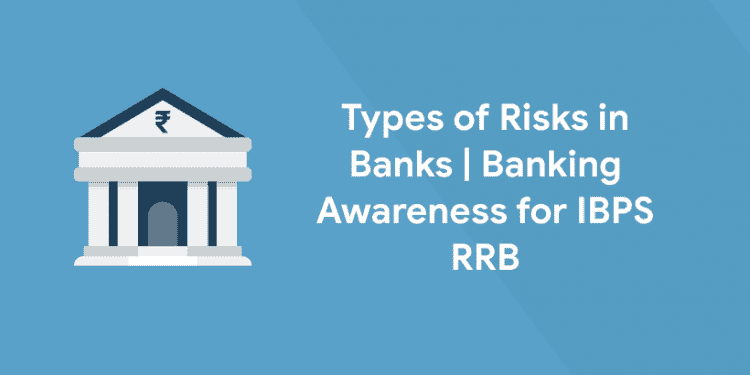Table of Contents
Risk is a term where a normal human being is feared of hearing. If a person aspires to be a banker and prepare for the banking exams the society may say that the person is taking a risk. We don’t know whether it is a risk or not. Because it is purely subjective. But for getting into the banking profession through bank examination he/ she must have known the risk associated with the banks in order to perform well in the banking awareness section of the bank exams. The bank exams 2020 is expected to have a major portion of questions from banking awareness and especially from risk associated with the banks.Through this blog we are discussing what are the risks associated with the banks as banking awareness notes for securing top ranks in the bank exams especially IBPS RRB 2020.
Attempt Rank Booster Test for IBPS RRB
What is meant by the risk in the banking sector?
As in the very literature sense risk means the happening of an unexpected event that could cause a disaster or a catastrophic effect. We might be heared of the saying that the bank has been collapsed the bank is on the edge of failure the investprs are nail biting..etc. But Now a days we don’t really hear that kind of news or reports. Because we have a string authority to regulate the functioning of the bank from collapsing. In india the regulstory body is RBI. RBI regulates all the banks in india for its smooth functioning and everything. The mechanism of Cash reserve Ratio (CRR) and Statuatory Liquidity Ratio (SLR) are some of the monetary policies of the RBI inorder to regulate the banking sector from collapsing and regulate the economy there.
Click Here to Know What is CRR and SLR
Likewise the RBI, there is another institution in the global scenario for the risk management and its regulation of the economy and that is Bank for International Settlements (BIS). One of the major processes of the BIS is Basel process. The Basel Process refers to the way in which the BIS promotes international cooperation among monetary authorities and financial supervisory officials. The BIS hosts 9 international organizations which comprise 6 committees and 3 associations engaged in standard setting and the pursuit of financial stability through the Basel process. Basel III is an internationally agreed set of measures developed by one of the committees in the BIS, Basel Committee on Banking Supervision (BCBS) in response to the financial crisis of 2007-09. The measures aim to strengthen the regulation, supervision and risk management of banks. Basel III is at its door steps waiting for the green signal for implementation.
Click Here to read More about the Basel III Norms and Regulations
Type of Risks
1: What does the acronym "ATM" stand for in banking?
There are different types of risks associated with the banking sector. Each risk explains different sections and functions of the banking sector itself. We can classify the major risks as in the following:
- Credit or Default risk
- Liquidity Risk
- Operational Risk
- Market Risk
- Interest rate Risk
- Reputational Risk
Now let us look into all of the risks in detail.
Enroll in Kerala's Top-rated Bank Coaching Program!
Are you ready to take your banking career aspirations to new heights? Join Entri App's Bank Exam Coaching program to kickstart your preparations!
Join Now!Credit or Default Risk
Credit risk, also known as default risk, is the potential that a bank’s customer or counterparty fails to meet its obligation to the bank in line with the terms of an agreement. Traditionally, credit risk is seen as the likelihood that a bank’s debtor is unable to repay the amount owed to the bank including principal and interest. One of the main activities conducted by a bank is lending. When some of its credits are not returned to the bank when a customer experiences financial problems, this is partially causing credit risk for the banks.
There are two variants of credit risk which are discussed below –
(a) Counterparty Risk: This is a variant of Credit risk and is related to non-performance of the trading partners due to counterparty’s refusal and or inability to perform. The counterparty risk is generally viewed as a transient financial risk associated with trading rather than standard credit risk.
(b) Country Risk: This is also a type of credit risk where non performance of a borrower or counterparty arises due to constraints or restrictions imposed by a country. Here, the reason for non performance is external factors on which the borrower or the counterparty has no control.
Liquidity Risk
Liquidity risk is the risk that a bank might not be able to meet its short-term financial demands or contractual obligations. Liquidity risk can also be viewed from a bank’s inability to dispose of its holding in securities or other assets without suffering unacceptable losses either of capital or income during the conversion process
It is mainly of three forms:-
(a) Funding Risk: Funding Liquidity Risk is defined as the inability to obtain funds to meet cash flow obligations. For banks, funding liquidity risk is crucial. This arises from the need to replace net outflows due to unanticipated withdrawal/ non-renewal of deposits (wholesale and retail).
(b) Time Risk: Time risk arises from the need to compensate for nonreceipt of expected inflows of funds i.e., performing assets turning into non-performing assets.
(c) Call Risk: Call risk arises due to crystallisation of contingent liabilities. It may also arise when a bank may not be able to undertake profitable business opportunities when it arises.
Operational Risk
Operational risk is the risk associated with a breakdown or failure of the internal process, the people and systems. They result from the inadequacies in the processes and systems put in place by the organization.
Two of the most common operational risks are discussed below –
(a) Transaction Risk: Transaction risk is the risk arising from fraud, both internal and external, failed business processes and the inability to maintain business continuity and manage information.
(b) Compliance Risk: Compliance risk is the risk of legal or regulatory sanction, financial loss or reputation loss that a bank may suffer as a result of its failure to comply with any or all of the applicable laws, regulations, codes of conduct and standards of good practice. It is also called integrity risk since a bank’s reputation is closely linked to its adherence to principles of integrity and fair dealing.
Enroll in Kerala's Top-rated Bank Coaching Program!
Are you ready to take your banking career aspirations to new heights? Join Entri App's Bank Exam Coaching program to kickstart your preparations!
Join Now!Market Risk or systematic risk
Systematic risk is related with the bank’s assets where their values are changed by the systematic factors. It is also called market risk and banks are usually engaged in market activities. Market risk can be related to any prices which are continuously traded on the financial markets. The risk of adverse deviations of the mark-to-market value of the trading portfolio, due to market movements, during the period required to liquidate the transactions is termed as Market Risk.
Interest Rate Risk
Interest Rate Risk arises when the Net Interest Margin or the Market Value of Equity (MVE) of an institution is affected due to changes in the interest rates. In other words, the risk of an adverse impact on Net Interest Income (NII) due to variations of interest rate may be called Interest Rate Risk. It is the exposure of a Bank’s financial condition to adverse movements in interest rates.
Reputational Risk
Reputational risk is another risk that banks face. Reputational risk depicts a deficiency in trust by stakeholders such as investors, shareholders, customers or regulators of a bank which is capable of impacting the image, credibility and business relationships of the bank. The business of banking is one that depends on trust and a positive perception of its stakeholders to flourish. Reputation is an invaluable asset that provides a bank with a competitive advantage over its peers and can positively affect the financial performance of the company.
Click Here to Download More Banking Awareness Notes
Conclusion
These are the major kinds of risks associated with the banking sector. New risks can evolve out of this box since the banking sector is enlarging every time. For a banking exam student to avoid his/her future risk of not getting out of the examination she/he must have been familiarised with these risks associated with the banking sector. Study with Entri and lead a risk free preparation. Keep studying Keep winning.












